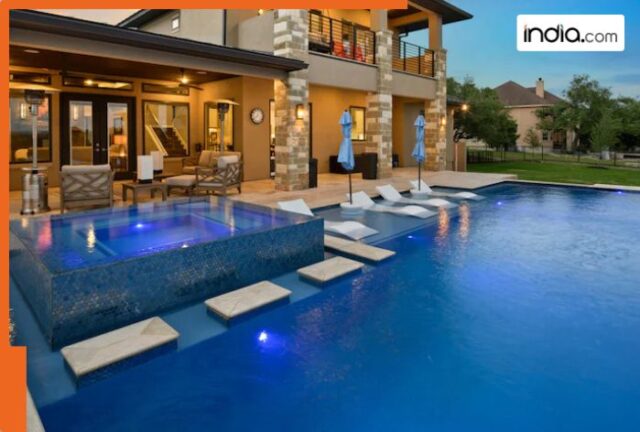Future-ready luxury homes are embracing energy-efficient designs and renewable energy integration to minimize environmental impact while enhancing comfort.
New Delhi: With a new focus on environmentalism, the definition of luxury living is changing. No longer confined to opulence alone, high-end homes are now being designed with sustainability, smart technology, and green luxury at their core. Developers are redefining luxury by integrating eco-conscious features and cutting-edge innovations that enhance comfort while reducing environmental impact.
A key driver of this shift is the growing preference for sustainable and tech-enabled living. Modern buyers, especially HNIs and affluent millennials, prioritize homes that promote well-being, energy efficiency, and seamless digital integration. Smart home automation, renewable energy solutions, and EV-ready infrastructure are becoming essential components of future-ready luxury residences. This evolution is fuelled by a global push toward sustainability and green living, coupled with increasing awareness of climate change and carbon footprints.
Moreover, a report by Resurgent India and NAREDCO reveals the green buildings market in India is anticipated to rise significantly, contributing $39 billion (Rs 3.2 lakh crore) by 2025. This trend highlights the growing emphasis on sustainable construction, with green buildings becoming a larger share of new developments. As a result, luxury homes are no longer just about aesthetics and exclusivity but also about mindful living, energy conservation, and future-proofing for an environmentally conscious era.
Ankit Kansal, MD, 360 Realtors says, “The luxury housing sector is undergoing a pivotal shift, driven by sustainability mandates and evolving buyer expectations. Regulatory frameworks, such as green building certifications and energy efficiency norms, are further pushing developers to adopt eco-conscious practices. Future-ready luxury homes are seamlessly integrating smart technology, renewable energy, and environmentally responsible materials. There is increased demand for technologies to optimize electricity & water consumption through IoT and analytics-enabled solutions. The demand for green luxury is no longer a niche but a mainstream preference among affluent buyers. Investors & home buyers are willing to pay a premium on projects that can ensure long-term sustainability. We believe that developers who align with these trends will lead the next phase of premium real estate growth.”
According to Savills report “Sustainable Real Estate: Strategies and Practices”, in India, over 7,000 IGBC green-certified projects account for an estimated total built-up area of 1,370 million sq ft across various states. The data highlights the industry’s commitment to reducing environmental impact and advancing sustainability in the sector.
Sandeep Chhillar, Founder and Chairman, Landmark Group , says “In the present day, luxury cannot be provided without including sustainability, wellness, and cutting-edge technologies. Buyers are increasingly drawn to properties that reduce carbon footprints while enhancing functionality and convenience. At Landmark Group, we foresee the future of high-end homes in creating spaces that are not just opulent but also sustainable and future-proof. We integrate advanced home automation systems, solar energy solutions, and climate-responsive designs to create homes that are future-proof. Our upcoming residential projects aim to prioritize energy efficiency and biophilic designs, ensuring that luxury living is in complete harmony with external environment factors.”
Moreover, future-ready luxury homes are embracing energy-efficient designs and renewable energy integration to minimize environmental impact while enhancing comfort. Developers are incorporating solar panels to harness clean energy, reducing reliance on conventional power grids and lowering long-term operational costs. Rainwater harvesting systems are being implemented to optimize water consumption, ensuring self-sustained ecosystems within high-end communities. Additionally, natural ventilation and passive cooling techniques are becoming key design elements, reducing dependency on artificial climate control and enhancing indoor air quality.
Further, EV-ready homes are emerging as a crucial element of this shift, offering seamless integration of electric vehicle charging infrastructure within high-end communities. This not only enhances convenience but also adds significant long-term value to the property, making it a future-proof investment.
Dr. Gautam Kanodia, Founder of KREEVA and Kanodia Group, says, “Luxury living is evolving towards sustainability, with developers increasingly committed to creating homes that redefine green luxury. Today’s discerning buyers seek residences that seamlessly integrate comfort, aesthetics, and environmental consciousness. The demand for future-ready homes is no longer a trend—it’s a necessity. At KREEVA, we are dedicated to designing living spaces that promote wellness while minimizing environmental impact, ensuring a sustainable future for luxury real estate.”
Ashwani Kumar, Pyramid Infratech, says, “With the rising demand for luxury homes, technology and sustainability are at the forefront shaping the next generation of luxury homes. The sector focuses on integrating smart home automation, AI-powered security, and EV-ready infrastructure to meet the evolving needs of luxury homebuyers. With the rise of electric mobility, EV charging stations are now a must-have in high-end residences. Buyers today want convenience, efficiency, and an eco-friendly lifestyle all in one. Thus, we believe that future-ready homes are not just about indulgence; they are about innovation, sustainability, and long-term value creation in luxury real estate.”
Therefore, the next decade will witness a fundamental transformation in luxury real estate, where sustainability, EV adoption, and smart technology will be the defining pillars of high-end living. As discerning buyers shift their focus from sheer opulence to mindful luxury and eco-conscious living, developers are responding by integrating green building principles, renewable energy solutions, and advanced home automation into their projects.















































